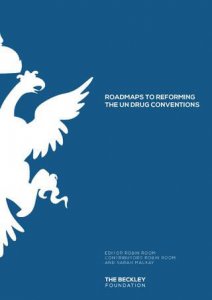
Roadmaps to Reforming the UN Drug Conventions
Report Summary
Global drug policies are based upon the provisions of the UN Conventions of 1961, 1971, and 1988, which outlawed production, trade, and possession of certain controlled substances (other than for very limited scientific and medical uses), including those derived from the coca leaf, the opium poppy, and cannabis. The three UN Drug Conventions impose a ‘one-size-fits-all’ prohibitionist approach to drug policy throughout the world, which has had devastating unintended consequences worldwide.
Amanda Feilding commissioned this report in 2012 to map out how the Conventions can be amended in order to give countries greater freedom to adopt drug policies better suited to their individual needs. In particular, the report details the treaty amendments that would be necessary if a country (or group of countries) wished to experiment with either i) clear decriminalisation or ii) the creation of a regulated market for one or more controlled substances.
The report’s editor and lead author is Professor Robin Room, one of the world’s leading experts on drug and alcohol policy. The report also includes contributions from lawyer Sarah MacKay, who puts forward and methodically analyses a series of specific treaty amendments that would give effect to the proposed reforms in those countries that signed up to them.
Podcast
- All
Links
- All
Support
- All
BIPRP
- All
Science Talk
- All
Amanda's Talks
- All
- Video Talk
- Featured
- 2016 Onwards
- 2011-2015
- 2010 and Earlier
- Science Talk
- Policy Talk
One-pager
- All
Music
- All
Amanda Feilding
- All
Events
- All
Highlights
- All
Psilocybin for Depression
- All
Current
- All
Category
- All
- Science
- Policy
- Culture
Substance/Method
- All
- Opiates
- Novel Psychoactive Substances
- Meditation
- Trepanation
- LSD
- Psilocybin
- Cannabis/cannabinoids
- Ayahuasca/DMT
- Coca/Cocaine
- MDMA
Collaboration
- All
- Beckley/Brazil Research Programme
- Beckley/Maastricht Research Programme
- Exeter University
- ICEERS
- Beckley/Sant Pau Research Programme
- University College London
- New York University
- Cardiff University
- Madrid Computense University
- Ethnobotanicals Research Programme
- Freiburg University
- Medical Office for Psychiatry and Psychotherapy, Solothurn
- Beckley/Sechenov Institute Research programme
- Hannover Medical School
- Beckley/Imperial Research Programme
- King's College London
- Johns Hopkins University
Clinical Application
- All
- Depression
- Addictions
- Anxiety
- Psychosis
- PTSD
- Cancer
- Cluster Headaches
Policy Focus
- All
- Policy Reports
- Advisory Work
- Seminar Series
- Advocacy/Campaigns
Type of publication
- All
- Original research
- Report
- Review
- Opinion/Correspondence
- Book
- Book chapter
- Conference abstract
- Petition/campaign
Search type
